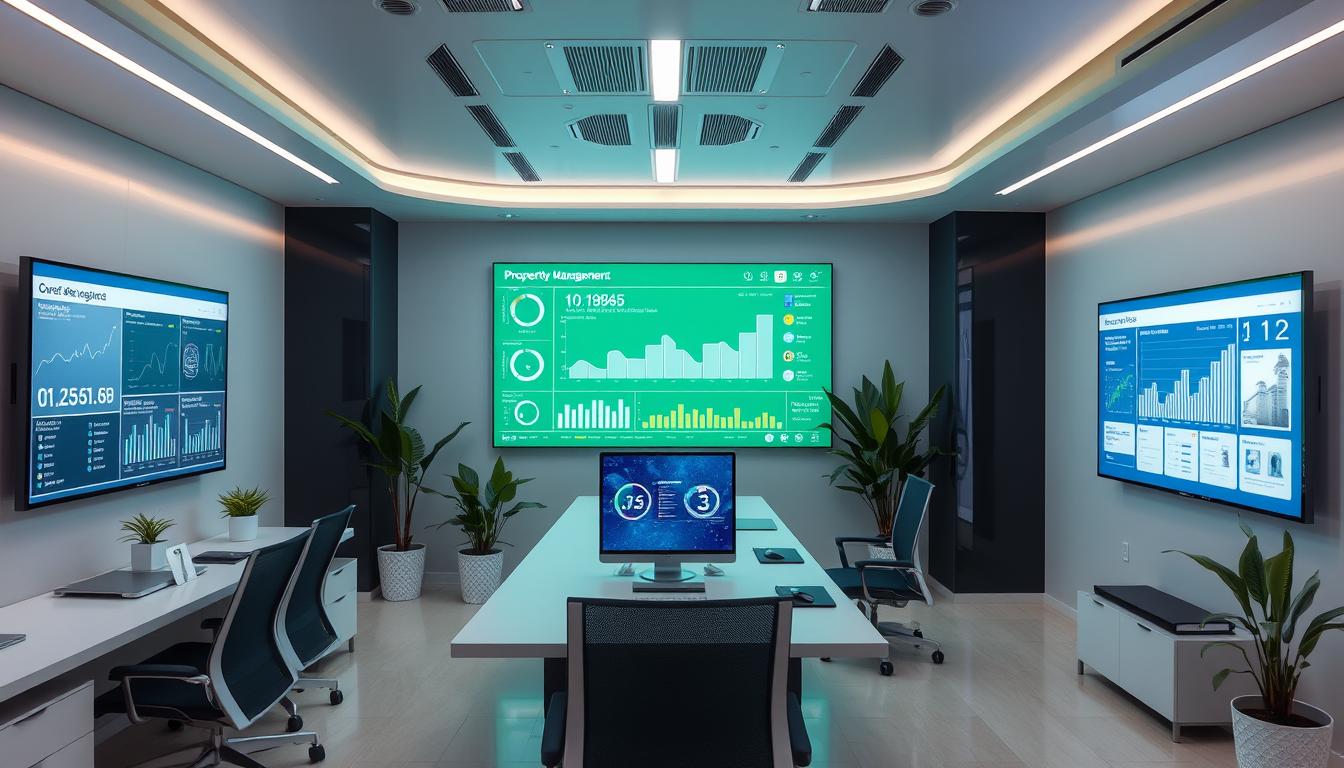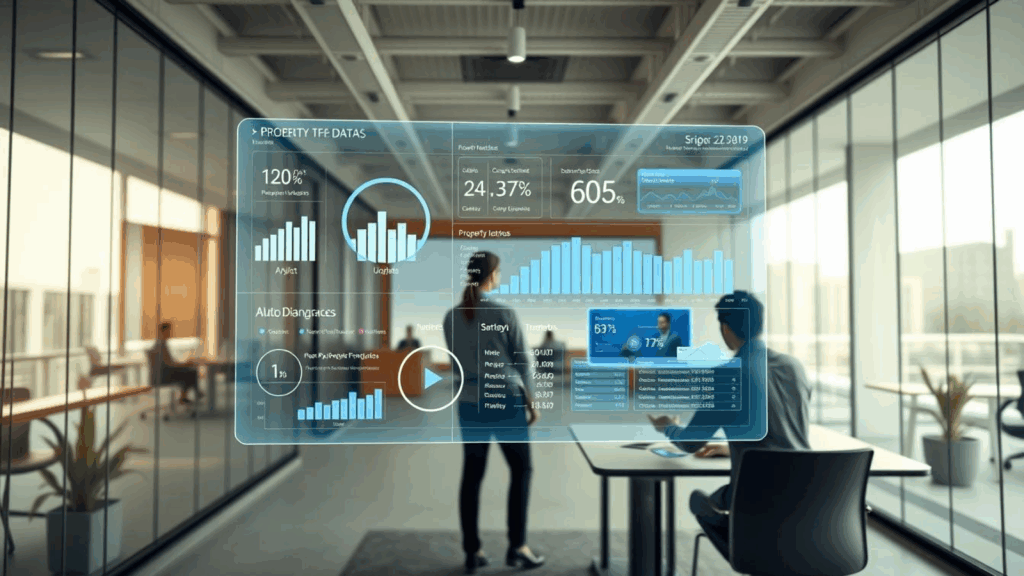In today’s fast-paced property management world, adopting modern solutions is crucial. Many technical managers and asset managers still use outdated tools like Excel. This leads to significant inefficiencies, wasting time and money. It’s vital for managers to identify and address these inefficiencies caused by the wrong tools.
Technical and asset managers oversee property management and development to achieve financial goals, despite not owning the properties. They need to be detail-oriented and make decisions based on data. Yet, outdated tools hinder their ability to manage effectively, causing issues like double data entry and limited self-service options for tenants. These problems can quickly escalate, wasting valuable resources.
The COVID-19 pandemic has significantly impacted the property management industry. The Big Shut-Down of 2020 led to reduced hours or job losses for many workers. The Great Resignation in 2021 saw a massive number of workers leave their jobs. Emergency rent relief programs and the subsequent inability of some property owners to pay mortgages further complicated the situation. The pandemic also saw a shift in tenant preferences, with many opting for suburban living over urban apartments.
To overcome these challenges, property managers are turning to modern proptech solutions. These solutions help streamline operations, reducing manual tasks and improving portfolio visibility. It also enables better tenant service. Many property managers now rely on software for efficient management, with a growing interest in built-to-rent homes in suburban areas.
Key Takeaways
- Outdated tools like Excel can lead to significant inefficiencies in property management
- Technical and asset managers are responsible for ongoing property management and development to realize financial goals
- The COVID-19 pandemic has had a profound impact on the property management industry, with shifts in tenant preferences and increased competition for affordable housing
- Modern solutions like Proprli can help streamline operations, improve visibility, and provide better tenant service
- Property management software is becoming increasingly important for efficient management processes, with built-to-rent homes showing growth in suburban areas
The Importance of Modern Property Management Solutions
In today’s fast-paced world, property managers face numerous challenges. Outdated practices and manual processes hinder their ability to manage properties effectively. Modern property management solutions offer a way to streamline operations, improve tenant experiences, and enhance overall efficiency.
Implementing a single system of record allows property managers to store all business information in one place. This eliminates the need for multiple databases and spreadsheets, reducing data inconsistencies and errors. With a modern system, data is accessible from anywhere, at any time, enabling informed decisions based on real-time data.
Modern property management solutions offer a wide range of features. They simplify and automate various aspects of property management, improving tenant relations and reducing downtime. Some examples:
- Tenant Management System
- Lease Tracking & Management
- Facility Management
- Quick and Easy Maintenance Requests
- Integrated Billing System
- Internal Communication Tools
- Financial Management & Reporting
- Maintenance Scheduling & Tracking
By leveraging these features, property managers can improve tenant relations and respond quickly to maintenance requests. Automation and digitization of workflows through software tools streamline processes, reduce costs, and save time compared to manual systems.
Modern property management systems also incorporate robust security mechanisms. These include data encryption and access limitations, ensuring data confidentiality and integrity. This is crucial given the increasing regulatory demands for data privacy and security in the real estate sector.
As the rental market evolves, property managers must adapt to meet modern consumer expectations. This includes providing comprehensive information in one location and ensuring mobile-friendly access. Catering to a broader audience is essential.
Upgrading to a modern property management solution enhances efficiency and tenant satisfaction. It also contributes to cost savings and improved strategic decision-making. By embracing the latest technologies and automation, property managers can focus on growing their business and fostering strong tenant relationships while minimizing risks.
Double Data Entry: A Time-Consuming Inefficiency
Property managers often find themselves in a cycle of inefficiency, manually entering data into multiple systems. Tasks such as processing online rental applications, updating tenant information, and tracking maintenance requests across various platforms lead to double data entry. This wastes valuable time and resources, which could be better spent on higher-value tasks.
This outdated practice is not only time-consuming but also prone to error. When property managers input the same information into different systems, the risk of making mistakes increases. These errors can cause significant problems, such as miscommunication with tenants, incorrect billing, or missed maintenance deadlines.
The consequences of double data entry extend beyond just wasted resources. Inconsistencies and inaccuracies in data can cause confusion and frustration for both property managers and tenants. It can also lead to a lack of trust and damage the professional reputation of the property management company.
| Manual Data Entry | Automated Data Entry |
|---|---|
| Time-consuming and inefficient | Quick and streamlined |
| Prone to human error | Accurate and consistent |
| Wastes valuable resources | Frees up time for high-value tasks |
By embracing modern property management solutions that automate data entry, property managers can eliminate the need for double data entry. This streamlines their operations. It saves time, reduces the risk of errors, and allows property managers to focus on providing excellent service to their tenants and growing their business.
Lack of Visibility: Making Informed Decisions
In the fast-paced world of property management, having access to real-time insights is crucial for making data-driven decisions. Technical real estate managers often face challenges due to limited visibility into key areas. These include vacancy status, overdue rent payments, and vendor performance. This lack of transparency makes it difficult to understand property performance metrics and make quick, informed decisions.
The global property management software market size was $1.64 Billion in 2021. It is expected to reach $2.70 Billion by 2030, with a CAGR of 5.73%. This growth shows the need for modern solutions that offer greater visibility and efficiency in property management.
Entering data into multiple systems wastes time and decreases accuracy. Traditional methods struggle to meet modern demands in property management. Property Management solutions like Yardi, MRI and Proprli can centralize data, automate tasks, and provide mobile access. This leads to greater efficiency and visibility.
Vendor management is another area where visibility is lacking. This can make it hard to select suitable vendors, ensure they adhere to standards, and manage their tasks efficiently. Clear visibility allows for quick, informed decisions about vendors. It also enables better negotiation and ensures compliance. Centralized systems for tracking vendor performance provide real-time updates on compliance, service quality, and cost-effectiveness.
| Vendor Management Component | Importance of Visibility |
|---|---|
| Sourcing | Identify and select suitable vendors based on performance metrics and compliance history |
| Procurement | Negotiate better terms and ensure cost-effectiveness through real-time insights |
| Compliance | Monitor vendor adherence to standards and regulations using centralized reporting tools |
By using integrated software solutions, centralized data systems, and real-time reporting tools, property management firms can enhance visibility. This improved transparency enables them to make more informed decisions. It optimizes processes and delivers better results for clients and stakeholders.
The Need for Self-Service Options
In today’s fast-paced world, residents expect convenience and efficiency when interacting with their property management companies. Without modern self-service tools, such as resident portals for online payments and maintenance requests, staff spend hours manually handling tasks. This time could be better used to provide exceptional service and enhance customer satisfaction.
Self-service options improve user experience and resident satisfaction across various sectors, including residential, self storage, and commercial. By empowering tenants to manage their needs, properties see faster rent payments and streamlined maintenance requests. This leads to reduced office calls, allowing staff to focus on efficiently handling complaints and ensuring a positive customer experience.
The impact of self-service options on customer satisfaction is significant. People make purchasing decisions based on emotion, and a positive experience can lead to favorable reviews and even serve as a recruiting tool. Timely responses to inquiries and a 24/7 call center for emergencies are key. Easy problem resolution, efficient interactions, reduced service requests, and positive online reviews also contribute to successful customer experience.
| Self-Service Option | Benefit for Tenants | Benefit for Property Managers |
|---|---|---|
| Online rent payments | Convenient and secure payment options | Faster rent collection and reduced manual processing |
| Maintenance request submissions | Easy and quick way to report issues | Streamlined workflows and improved efficiency |
| Real-time status tracking | Transparency and clear communication | Enhanced tenant satisfaction and trust |
| Knowledge base access | Self-help resources for common tasks | Reduced time spent on routine inquiries |
As the commercial real estate industry evolves, self-service maintenance is becoming increasingly popular. Tenants seek out properties offering these options, showing a shift in consumer behavior. By adopting comprehensive property management software like Easyworkorder, which facilitates self-service maintenance, property managers can improve efficiency and communication. This leads to increased tenant satisfaction. Embracing self-service options is now a necessity for the future of tenant-property manager interactions in the real estate sector.
Streamlining Vendor Management
Property managers often face challenges with multiple vendors, such as miscommunication and delays. These issues can negatively impact operational efficiency and service quality. Effective vendor management includes selecting vendors, negotiating contracts, controlling costs, and ensuring service delivery. By streamlining these processes, property managers can lower costs, improve service quality, reduce risks, and increase visibility and value from vendors.
Managing multiple vendors is crucial for quality maintenance and cost control in property and community management. Property management software enhances communication between managers and vendors. It streamlines the flow of information and reduces misunderstandings. The software also facilitates document management, enabling easy organization and storage of critical documents such as contracts and insurance papers.
Features in property management software allow tracking of vendor performance. This helps managers assess reliability, efficiency, and work quality. Financial components assist in budget administration, spending monitoring, and invoice processing. This enables managers to coordinate services, track performance, and maintain visibility while adhering to budgetary restrictions.
| Vendor Management Activity | Benefits |
|---|---|
| Selecting vendors | Find reliable, high-quality vendors |
| Negotiating contracts | Secure favorable terms and pricing |
| Controlling costs | Adhere to budgets and avoid overspending |
| Ensuring service delivery | Maintain quality and meet expectations |
| Tracking performance | Assess reliability, efficiency, work quality |
In the investment and asset management sector, streamlining vendor management can lead to significant cost savings and efficiency gains. Utilizing industry-specific CRM systems and portfolio management software can greatly improve vendor management processes. These solutions allow for quick communication, decision-making, contract management, and staying aware of critical dates to avoid service interruptions or financial penalties. Enhanced vendor management capabilities in such systems lead to streamlined workflows and optimized processes. This results in a more efficient and effective process that maximizes value for all parties involved.
The Importance of Mobility in Property Management
In today’s fast-paced property management landscape, mobility is key to success. Clients, tenants, and owners demand greater accessibility and responsiveness. Technical property managers must adopt modern software solutions for remote access and streamlined field work. Investing in tablets, line of business applications, and cloud-based technologies boosts employee satisfaction and customer experience.
Many property management professionals now work from the road, emphasizing the need for secure document sharing and remote access. Cloud hosting offers a cost-effective way to access critical information and tools while mobile. This shift to mobile technology reduces time and costs, making companies more competitive.
The use of mobile devices and specialized software has revolutionized property management. For example, modern property inspection software and apps boosts efficiency and accuracy during field work. These tools enable quick documentation of issues, communication with tenants, and real-time decision-making. This leads to higher tenant satisfaction and lower vacancy rates.
| Mobility Trend | Impact on Property Management |
|---|---|
| Increased use of tablets and line of business applications | Enhances remote access and streamlines field work |
| Adoption of cloud hosting for data mobilization | Enables cost-effective access to critical information and tools |
| Integration of mobile devices with specialized software | Improves efficiency, accuracy, and customer experience |
| Emphasis on data accessibility outside the office | Supports informed decision-making and responsiveness |
As the need for hybrid flexibility grows, property management companies focusing on mobility will attract and retain top talent. Offering secure remote work options and investing in mobile technologies leads to a more satisfied and productive workforce. This results in better service delivery and increased profitability.
Standardizing the Training Process
Inconsistent training processes can hinder property management teams significantly. New hires, without specific training, take longer to adapt, often missing vital information. This delay can lead to decreased productivity and lower service quality. Implementing specialized software for onboarding can streamline the process, ensuring new team members are well-prepared and consistent.
Studies highlight the benefits of standardizing processes. They show increased efficiency, better quality, and the attraction of top talent. Non-standard processes can lead to quality and productivity issues. Standardization ensures all steps are correctly followed, enhancing quality and reducing errors, thus boosting customer satisfaction.
Standardized training can also reduce costs associated with onboarding. This is vital in property management, where managers oversee a large number of units. Consistent service across properties is key to maintaining reputation and client loyalty.
| Benefits of Standardized Training | Impact on Property Management |
|---|---|
| Increased efficiency | Faster onboarding and task completion |
| Improved quality | Reduced errors and increased customer satisfaction |
| Talent attraction | Streamlined processes appeal to top candidates |
| Cost reduction | Lower training costs and improved workflows |
Investing in a standardized training process tailored to each role is crucial. It ensures new hires adapt quickly, maintain service consistency, and drive better results. Adopting software solutions for this purpose can be transformative in today’s competitive property management environment.
Conclusion
In today’s competitive real estate market, technical property managers must adopt modern, purpose-built software solutions. These tools are essential for future-proofing operations and maximizing profitability. By using these advanced tools, property management companies can streamline inefficient processes. They can also improve visibility into key metrics, enable self-service options, and mobilize their workforce for increased productivity.
Implementing a comprehensive property management software solution can help address hidden costs. These costs include double data entry, lack of visibility, and inefficient vendor management. By automating repetitive tasks, centralizing data, and providing real-time insights, these solutions enable property managers to make informed decisions. This leads to reduced expenses and enhanced tenant experiences.
Real-world success stories show the tangible benefits of streamlining operations with modern property management software. Companies that have made the switch report significant improvements in efficiency, tenant satisfaction, and bottom-line results. To stay competitive in an increasingly digital landscape, technical real estate managers must prioritize the adoption of these cutting-edge tools. They should also continuously seek ways to optimize their processes.
By embracing change and investing in the right technology, property management companies can position themselves for long-term success. They can ensure they remain agile, responsive, and profitable in the face of evolving market demands. The future of property management lies in the strategic implementation of innovative solutions. These solutions drive efficiency, enhance decision-making, and ultimately, maximize profitability.
FAQ
What are some common inefficiencies caused by using outdated property management tools like Excel?
Outdated tools lead to inefficiencies like manual data entry and limited data access. This results in lost time, money, and potential errors. It impacts operational efficiency and profitability.
How can modern property management solutions help streamline operations and boost efficiency?
Modern solutions offer a single system for all business data, accessible anywhere. This automates tasks, improves metric visibility, and enables self-service. It streamlines operations and boosts efficiency.
What are the risks associated with manually entering information into multiple systems?
Manual entry into multiple systems is time-consuming and prone to errors. It can lead to data inconsistencies, affecting decision-making and efficiency.
Why is real-time visibility into key metrics important for technical real estate managers?
Real-time visibility into metrics like vacancy and overdue rent is crucial. It helps understand property performance and make quick, data-driven decisions. Without it, managers may miss key insights and opportunities.
How can self-service options improve the resident experience and satisfaction?
Self-service options, like online payments and maintenance requests, enhance the resident experience. They allow for transactions without human interaction. This is preferred by younger generations and frees staff to focus on other areas.
What are the benefits of streamlining vendor management through property management software?
Streamlining vendor management through software improves coordination and performance tracking. It ensures vendors meet expectations, enhancing operational efficiency.
Why is remote access to data and tools important for technical property managers?
Remote access to data and tools is crucial for productivity on the go. It enables faster decision-making and improves employee satisfaction. It’s vital in today’s business environment.
How can a standardized training process through software improve onboarding efficiency?
A standardized training process tailored to each role speeds up onboarding. It ensures new hires have the necessary information. Consistent onboarding through software streamlines training and reduces future issues.






